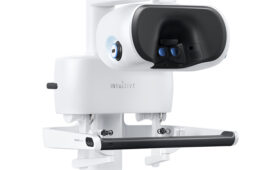 More than one year after receiving the first of two federal grand jury subpoenas seeking information about its products and communications with the FDA, iRhythm Technologies has said little publicly about the matter.
More than one year after receiving the first of two federal grand jury subpoenas seeking information about its products and communications with the FDA, iRhythm Technologies has said little publicly about the matter.
It would have been easy to miss the San Francisco-based cardiac monitor maker’s initial disclosure last summer.
iRhythm (Nasdaq:IRTC) was without a permanent CEO due to Mike Coyle’s sudden resignation in June after four months on the job. IRTC shares seemed to be headed toward historic lows, falling nearly 80% from the start of 2021 as reimbursement rates for cardiac monitoring plunged and then bounced around in a way that one analyst called “beyond bizarre.”
“Investors had vertigo,” Oppenheimer analyst Suraj Kalia said of last year’s pricing drama. “The dizzying pace of what is going on was confusing everyone. And I can tell you, in my 18 years of doing sell-side, I’ve never seen anything like this. Never.”
Then on Aug. 9, 2021, iRhythm disclosed the first subpoena in its second-quarter 10-Q SEC filing: “On March 26, 2021, the Company received a subpoena from the U.S. Attorney’s Office for the Northern District of California requesting information related to communications with the Food and Drug Administration and the Company’s products. We have not been informed that the Company is considered a target of the investigation or committed any violations. The Company is cooperating fully and is providing the requested information.”
Three months later, iRhythm’s disclosed a second subpoena seeking more information in its third-quarter 10-Q SEC filing. But this time, the company didn’t include the sentence most likely to reassure investors in the first disclosure: “We have not been informed that the Company is considered a target of the investigation or committed any violations.”
iRhythm hasn’t said if the situation has changed or whether it now believes it is a target of an investigation or committed violations. In fact, the company does not appear to have made any public statements about the subpoenas or investigation beyond the disclosures, which the company included in its most recent 10-Q quarterly filing last week.
Executives and analysts have not discussed the subpoenas on earnings calls, according to a Medical Design & Outsourcing review of transcripts and recordings.
iRhthym included no new information about the subpoenas in its latest quarterly report, filed with the SEC on May 6. The company this week declined to answer questions.
“We have no comment at this time,” the company said through a representative.
Adding to the saga, an investor lawsuit filed in February 2021 by the Public Employees’ Retirement System of Mississippi accused Coyle, former CEO Kevin King and CFO Doug Devine — who served as interim CEO after Coyle’s departure — of violating securities law.
Specifically, the lawsuit accused iRhythm and the three men of making “18 false or materially misleading statements in violation of federal securities law regarding iRhythm’s engagement in the regulatory price-setting process and defendants’ knowledge of the risks that the company faced.”
U.S. District Judge Edward Chen in California’s Northern District dismissed that potential lawsuit on March 31 and the case is headed toward an appeal, court records show.
iRhythm “believes the class action to be without merit and plans to vigorously defend itself,” the company said in its latest quarterly filing.
It’s not clear if the lawsuit and subpoenas are connected in any way.
What’s at stake with subpoenas
The subpoenas and federal grand jury investigation don’t necessarily mean that iRhythm is in serious legal jeopardy. Only a small share of companies that receive subpoenas are affected in a significant way, said Kalia, who couldn’t recall any discussion about the matter between analysts and iRhythm.
A subpoena is a fact-finding mission, not a determination that the government thinks a company has done something wrong, said a former FDA enforcement attorney who’s not involved in the iRhythm situation but agreed to speak generally about subpoenas without being named.
Still, it takes time, focus and financial resources to deal with subpoenas and grand jury investigations, not to mention the risks that come with handing internal documents to federal prosecutors or allowing executives and other employees to testify under oath.
Subpoenas, litigation and other legal matters “could have an adverse impact on the Company’s reputation, business, and financial condition and divert the attention of its management from the operation of its business,” as iRhythm explains in its SEC filings. “These matters are subject to many uncertainties and outcomes that are not predictable.”
The secrecy of federal grand juries means it’s possible we might never learn more about the investigation if it doesn’t result in an indictment or other charges, barring leaks from investigators, company officials or anyone with direct knowledge of the case.
Because the government usually keeps a tight lid on its criminal investigations, the only thing the public might learn about them is what the company discloses in its investor filings or discusses willingly.
For example, when Royal Philips disclosed a Department of Justice subpoena for recall-related information last month, CEO Frans van Houten took questions about it from analysts but said he could not divulge much.
“At this time, it’s a subpoena for information. That means they are preparing an investigation, and we just have to accept that,” he said.
“I’m only able to share that there is a subpoena for information related to an investigation by the DOJ, and I cannot predict anything else,” van Houten later told an analyst who asked about the subpoena. “I’m unable to predict how this will go. I’m sorry. I understand why you want to know, but there’s nothing more that I can share today.”





![A photo of the Medtronic GI Genius ColonPro polyp detection system flagging a potential sign of colon cancer during a colonoscopy. [Photo courtesy of Medtronic]](https://www.medicaldesignandoutsourcing.com/wp-content/uploads/2024/04/Medtronic-GI-Genius-doctors-268x170.jpg)

